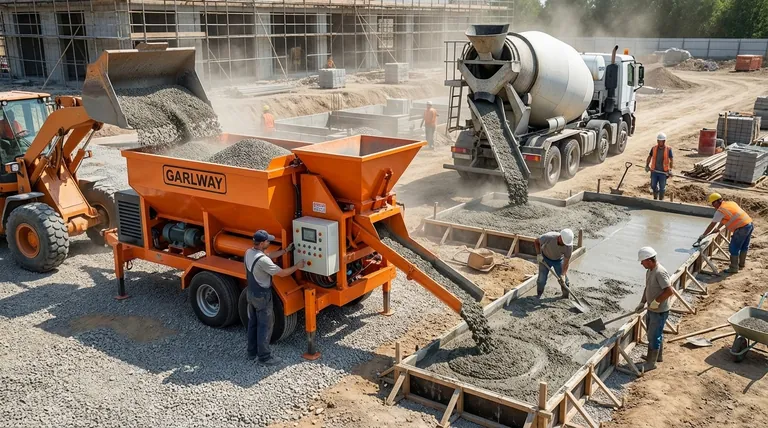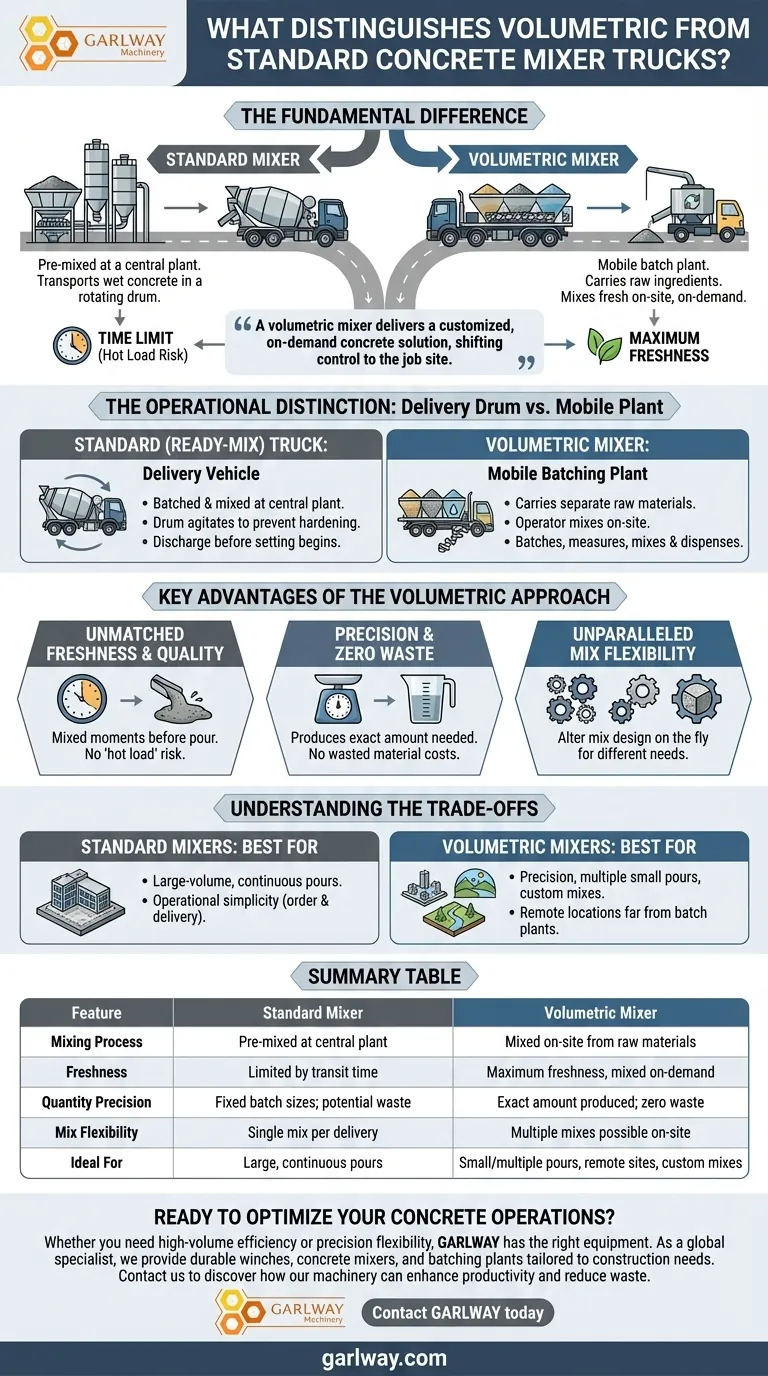The fundamental difference is where and when the concrete is mixed. A standard concrete truck transports wet, pre-mixed concrete from a central plant in a rotating drum. A volumetric mixer is a mobile batch plant on wheels; it carries raw, separate ingredients and mixes them into fresh concrete on-site, precisely when and where it's needed.
While a standard truck delivers a pre-determined batch of concrete, a volumetric mixer delivers a customized, on-demand concrete solution. This core difference shifts control over freshness, quantity, and mix design directly to the job site.

The Operational Distinction: Delivery Drum vs. Mobile Plant
The distinction between these two types of trucks goes to the heart of how concrete is produced and managed for a construction project.
How a Standard (Ready-Mix) Truck Functions
A standard truck is essentially a delivery vehicle. Concrete is batched and mixed at a central plant according to a specific order, then loaded into the truck's drum.
The drum rotates during transport not to mix the ingredients, but to agitate the pre-mixed concrete, preventing it from hardening before it can be poured. This creates a time limit—the concrete must be discharged before it begins to set.
How a Volumetric Mixer Functions
A volumetric mixer operates as a self-contained, mobile batching plant. It carries all the necessary raw materials—sand, stone, cement, water, and any admixtures—in separate, onboard compartments.
The ingredients remain unmixed during transport. Upon arrival at the job site, an operator uses the machine's controls to measure and combine the materials, producing fresh concrete on the spot. It batches, measures, mixes, and dispenses all from one unit.
Key Advantages of the Volumetric Approach
Mixing on-site creates several distinct advantages that are critical for certain types of projects.
Unmatched Freshness and Quality
Because the concrete is mixed moments before it is poured, it is always at maximum freshness and strength. This completely eliminates the risk of a "hot load"—concrete that has been in transit too long and has begun to set.
Precision and Zero Waste
The volumetric mixer produces the exact amount of concrete required. If you need 4.5 cubic yards, you make 4.5 cubic yards. There is no paying for wasted material or dealing with the cost and environmental impact of disposing of leftover concrete from a standard truck.
Unparalleled Mix Flexibility
The mix design can be altered on the fly. An operator can pour a footing with one strength of concrete and then immediately adjust the settings to produce a different mix for a slab or curb without needing to order another truck.
Understanding the Trade-offs
The benefits of on-demand mixing come with certain considerations that make standard trucks a better fit for other scenarios.
Large-Volume Pours
For massive, continuous pours like a large building foundation, standard ready-mix trucks often have the advantage. Their ability to deliver large, pre-mixed batches in rapid succession can be more efficient for projects requiring a high volume of a single mix design.
Operational Simplicity
Using a ready-mix service simplifies logistics. You place an order, and a truck arrives with the finished product. Operating a volumetric mixer requires a skilled technician who acts as both a driver and a batch plant operator, managing the mix specifications on-site.
Making the Right Choice for Your Project
Choosing between a volumetric and a standard mixer depends entirely on the specific demands of your job.
- If your primary focus is a large, continuous pour with a single mix design: A standard ready-mix truck is often the most efficient solution for delivering high volume quickly.
- If your primary focus is precision, multiple small pours, or custom mixes: A volumetric mixer offers superior flexibility, eliminates waste, and ensures maximum freshness.
- If your primary focus is working in a remote location far from a batch plant: The self-contained nature of a volumetric mixer makes it the most practical, and sometimes only, option.
Ultimately, selecting the right equipment is about matching the tool's core strength to your project's specific goal.
Summary Table:
| Feature | Standard Mixer | Volumetric Mixer |
|---|---|---|
| Mixing Process | Pre-mixed at a central plant | Mixed on-site from raw materials |
| Freshness | Limited by transit time | Maximum freshness, mixed on-demand |
| Quantity Precision | Fixed batch sizes; potential waste | Exact amount produced; zero waste |
| Mix Flexibility | Single mix per delivery | Multiple mixes possible on-site |
| Ideal For | Large, continuous pours | Small/multiple pours, remote sites, custom mixes |
Ready to Optimize Your Concrete Operations?
Whether your project requires the high-volume efficiency of standard mixers or the precision and flexibility of volumetric solutions, GARLWAY has the right equipment for you. As a global specialist in construction machinery, we provide durable and reliable winches, concrete mixers, and concrete batching plants tailored to the needs of construction companies and contractors.
Let us help you match the perfect tool to your project's goal. Contact GARLWAY today to discuss your requirements and discover how our machinery can enhance your productivity, reduce waste, and deliver superior results.
Visual Guide

Related Products
- JZC1000 Industrial Concrete Mixer Machine Cement Mixer Price
- Harbor Freight JS1500 On Site Concrete Mixing Volumetric Cement Mixer
- Belle Cement Mixer JS2000 Volumetric Concrete Mixer for Harbor Freight
- JW1000 Mobile Cement Mixer Concrete Mixer Truck and Batching Plant
- HZS35 Small Cement Concrete Mixing Batch Plant
People Also Ask
- Can you mix self leveling concrete in a cement mixer? Avoid Costly Flooring Mistakes
- How much weight can a cement mixer hold? A Guide to Choosing the Right Size for Your Project
- How to service a cement mixer? A Step-by-Step Guide for Longevity & Performance
- Do you put water or cement in a cement mixer first? Master the Professional Layering Method
- Can you mix mortar in a cement mixer? Avoid weak joints and project failure.



















